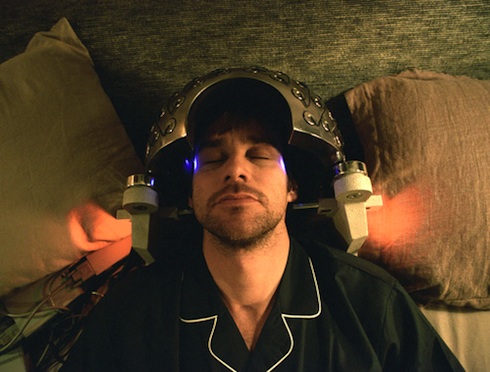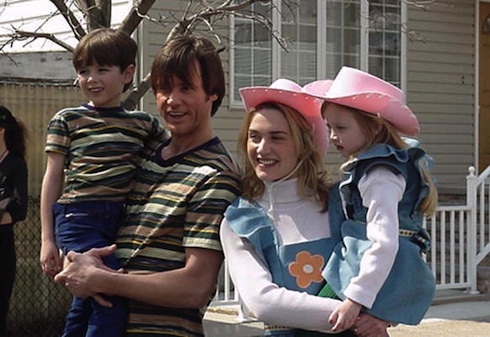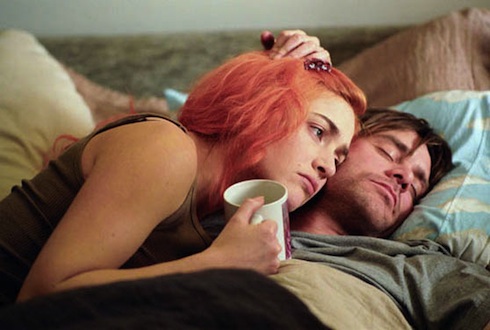Writing teachers and critics frequently point out that having a story begin with a character waking up in the morning is sloppy storytelling. And yet, every once and awhile, a cliché like this works so perfectly that you don’t even notice. Eternal Sunshine of the Spotless Mind opens with Joel (Jim Carrey) waking up in bed. Screenwriter Charlie Kaufman gets away with this and nearly everything else in this film because of one simple conceit: he’s asking us to just go with it, but doesn’t make any promises he’s going to explain anything. Kaufman isn’t too concerned with making us think. He’s more about getting us to relate.
By now, most are aware that memory erasure is the primary science-fiction conceit of Eternal Sunshine. Specifically, characters are destroying the memories of a failed relationship that is just too painful to possibly endure. Kaufman doesn’t have to work hard to convince us of the motivations someone would possess for doing such a thing; we’ve all had our hearts broken and wondered aloud, “I wish I’d never met that person.” This movie takes that notion into wish-fulfillment territory and postulates, “what if you could erase them from your mind?” The idea of hiding from the things we don’t want to remember is already pretty hefty stuff, but adding a mechanized system in which society codifies this need and mercilessly executes it, makes this SF concept all the more potent.
 Many of us have probably gotten blackout drunk after a break-up in real life, something the film communicates with when Dr. Mierzwiak (Tom Wilkinson) claims that after the memory erasure, the patient will experience a feeling similar to “a night of heavy drinking.” But other than a few sentences about creating a map of one’s brain, we’re never really told in a technical way how the memory erasure process works. In fact, in an almost-background line of dialogue barely heard in one scene, the validity of the how the memory erasure even functions is called into question: when Joel first enters the Lacuna offices we can hear Mary (Kirsten Dunst) on the phone explaining to a customer that they cannot have the process done “twice in a row.” Now, if the memory erasure actually works, then no one would be able to actually call the offices to ask for it again. It’s possible this customer was asking to have a different memory erased, though that seems unlikely. Ultimately, this one small throwaway line was probably just intended as a joke. But, when the entirety of the film’s arc seems to revolve around the fact that some memories are just too strong to be zapped, this small quip might be interpreted as foreshadowing.
Many of us have probably gotten blackout drunk after a break-up in real life, something the film communicates with when Dr. Mierzwiak (Tom Wilkinson) claims that after the memory erasure, the patient will experience a feeling similar to “a night of heavy drinking.” But other than a few sentences about creating a map of one’s brain, we’re never really told in a technical way how the memory erasure process works. In fact, in an almost-background line of dialogue barely heard in one scene, the validity of the how the memory erasure even functions is called into question: when Joel first enters the Lacuna offices we can hear Mary (Kirsten Dunst) on the phone explaining to a customer that they cannot have the process done “twice in a row.” Now, if the memory erasure actually works, then no one would be able to actually call the offices to ask for it again. It’s possible this customer was asking to have a different memory erased, though that seems unlikely. Ultimately, this one small throwaway line was probably just intended as a joke. But, when the entirety of the film’s arc seems to revolve around the fact that some memories are just too strong to be zapped, this small quip might be interpreted as foreshadowing.
What actually happens in this movie? Joel wants his memories of Clementine (Kate Winslet) erased after discovering that Clementine has erased him. This leads him to the Lacuna offices where he demands to have the procedure done without an appointment. The commentary on their relationship here is clear. Joel feels as though he will enact a find of revenge on their break-up by erasing her too. “You did it to me first,” he says to the memory-version of Clementine later. However, as the procedure begins, Joel’s memories of Clementine fight back and attempt not to be erased, leading him to insert her into different memory contexts in order to protect her.
 How could this possibly work from a neurological point of view? Chances are it wouldn’t. But what’s great about Joel incorporating Clementine into his childhood memories in order to hide her is that it comments on how much we wish our loved ones could protect us in all eras of our lives. Again, wish fulfillment comes into play, as Joel is able to have his adult girlfriend rescue him from taunting children at a young age. Here, we get time-travel and memory reassignment inside of a small alternate universe in one man’s brain. And because the characters are so fully developed, we’re not wondering for one second how the technology functions.
How could this possibly work from a neurological point of view? Chances are it wouldn’t. But what’s great about Joel incorporating Clementine into his childhood memories in order to hide her is that it comments on how much we wish our loved ones could protect us in all eras of our lives. Again, wish fulfillment comes into play, as Joel is able to have his adult girlfriend rescue him from taunting children at a young age. Here, we get time-travel and memory reassignment inside of a small alternate universe in one man’s brain. And because the characters are so fully developed, we’re not wondering for one second how the technology functions.
And, as mentioned before, the technology doesn’t really function, at least not correctly. This speaks to Neil Gaiman’s 2nd Law that “All scientifically possible technology and social change predicted in science fiction will come to pass, but none of it will work properly.” Kaufman isn’t making commentary on trying to use technology to fix our problems, he’s simply pointing out that we already try to do this in real life and it almost never works. How many times do people repeat the same patterns in relationships before they break the cycle? Should they break the cycle? After both having their memories of each other erased, Joel and Clementine still manage to find each other and have conversations that are similar to the ones they had when the first met “for real.” Is Kaufman being fatalist here and giving us a message that they are indeed destined to be together?
Maybe, maybe not. Because he also painfully makes the characters remember their fights by having both discover audio recordings they made just prior to having their brains wiped. This discovery then leads them into another fight, with the characters asking each other if they’re willing to give it another shot, despite having evidence that it will probably end up badly. One interpretation of the film’s ending is that they indeed will get back together and eventually be fine, having worked through all these problems. Another way of looking at it is that they will be locked in this cycle forever, and that the memory erasure actually briefly brought them closer together. Is Kaufman explaining this to you? Certainly not. In my view, he’s even less concerned with how you interpret the end of the movie than he is with how the technology actually functions.
He does offer a reason as to why he uses the cliché of starting a story when a character first wakes up. Because Joel doesn’t have all the information about what has happened the previous night and, by putting him in the bed at the beginning, we don’t either. This gives us a little mystery, which gets us hooked right away.
As for the mystery of painful love, Kaufman doesn’t have any answers, just more questions. And that’s a cliché too, but you know what? It works.
Ryan Britt is a staff writer for Tor.com. He doesn’t have a memory of the first time he saw this movie.










